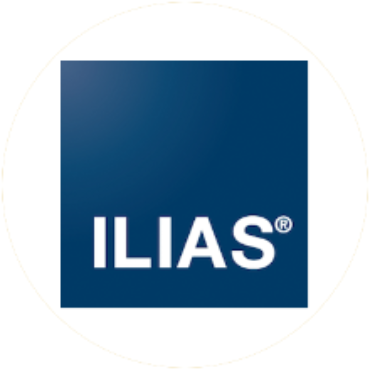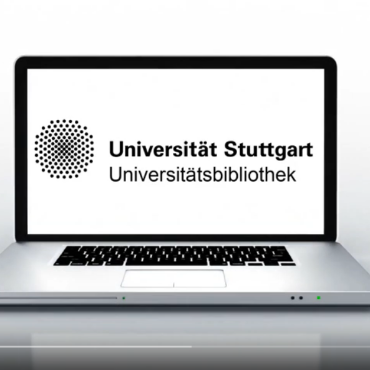Course Offer and Information Competence
The University Library’s guided tours and courses are offered regularly at both City Center and Vaihingen location, especially at the beginning of the semester, however. The number of participants per course is restricted for lack of space, so please register in time via the online registration.
If required, further events and dates can be offered – for groups, seminars, tutorials, or new employees, for example.
If you are interested, please contact: Hannah Kempe or Ute Dittmar (Vaihingen).
Courses of the University Library
Introduction and Copyright and Creative Commons
If you are beginning with Master's studies at University of Stuttgart and you want to use library resources, this tour is for you. On our library tour we will familiarize you with the University of Stuttgart Library's layout and resources. You will find out about opening hours, borrowing rights, loan periods, finding books and journals, requesting items, placing holds and checking your library account. You will learn how to use our online catalog and other internet-based library services. You will learn how to access electronic journals, databases and other licensed electronic resources.
The focus will be on subjects for international Master's programs of science or engineering. Other international students, scientists or employees are also welcome.
Duration: 60 minutes
Part 1: Creative Commons and German Copyright (not only) for OER and Open Access
The first part of the cours focuses primarly on copyright law. Using a relatively simple model, questions about limitations and licences - such as Creative Commons - become almost self-explanatory.
Part 2: Creative Commons in practice
In the second part we take a more practical approach and explore how to reference our own as well as third-party works with Creative Commons licenses.
Disclaimer: This course is an "educational" media literacy offering and does not constitute legal advice.
More on Creative Commons Licenses at the University Library you'll find in the OER as well as in the Open Access section.
Duration: 120 minutes
Dates and registration:
Part 1: here
Part 2: here
Please register up to 3 days before the date.
Contact: Wiebke Hengst
Courses of the TU9 Libraries
Research Data Management
In your research, a large amount of digital data and possibly software is created. You may also reuse data and software from previous research projects. A lot of questions about research data management come along, e.g.
- What are the "Guidelines on Digital Research Data at TU Darmstadt"?
- Where do I save my data safely and securely?
- How do I keep track of my data?
- Does anyone else understand my data?
- Who actually owns research data and who may use it?
- What standards, best practices and tools for dealing with data are there in my field?
- Where and how can I archive or publish selected data?
- What happens to the data after my project is completed?
- How does the research data team at TU Darmstadt - TUdata - support me in handling my data?
We will answer these and other - and above all your - questions during this workshop. In particular, we will get to know the TUdata tools: TUdmo, TU-GitLab, TUdatalib.
Note: Please bring along data from your own research.
Target audience: Researchers
Date: 20.05.2025 9:50 a.m. - 11:20 a.m.
Lecturer: Jürgen Windeck
Tool used: Zoom
Registration: Registration until 24h before the start of the workshop via Cituro.
Further information you will find here.
Bibliometrics
Bibliometrics deal with the quantitative analysis of scientific publications using statistical methods. Areas of application include research evaluation (e.g. rankings) as well as research support (e.g. identification of research trends). Altmetrics record usage indicators of electronic publications, such as downloads, mentions in social networks, etc.
- What are bibliometrics?
- What key figures are there and how are they calculated?
- Where can I find the key figures?
- What are the applications of the indicators?
- Do the metrics say anything about the quality of publications?
- What are altmetrics?
You will get answers to these questions in the workshop and can apply your new knowledge directly to practical examples.
Target audience: Scientific staff
Lecturer: Harald Gerlach (ULB Darmstadt)
Date: 25.06.2025 5:10 p.m. - 6:40 p.m.
Tool used: Zoom
Link for registration here.
Further information here.
Text processing
Once you have taken your first steps with LaTeX, more specific questions often arise. This short workshop teaches how to cite and create bibliographies in LaTeX according to the recommendations of the APA (American Psychological Association). We will work with the collaborative writing platform Overleaf (via tex.zih.tu-dresden.de). It is not necessary to register with Overleaf for the workshop.
This workshop is part of a LaTeX Workshop Series offered to get you started with LaTeX. For more workshops please see here!
Previous knowledge: Basic knowledge of LaTeX from "LaTeX - Hands-On-Workshop for Newbies" or comparable
Lecturer: Katharina Zinke (Research-related Services, SLUB Dresden)
Date: 04.06.2025 3 p.m. - 4 p.m.
Target audience: Students, Researchers
Tool used: Zoom
Registration and further informations here.
Professionally typeset CVs can make or break an application. Also for this task, LaTeX offers great possibilities to create visually appealing documents with concise content and thus stand out from the MS Word monotony. In this short workshop, we will use the LaTeX knowledge you have already acquired in other contexts, e.g. our LaTeX introduction for newbies, and work with the currvita package (https://ctan.org/pkg/currvita), among others. We will work with the collaborative writing platform Overleaf (via tex.zih.tu-dresden.de). It is not necessary to register with Overleaf for the workshop.
This workshop is part of a LaTeX Workshop Series offered to get you started with LaTeX. For more workshops please see here!
Previous knowledge: Basic knowledge of LaTeX from "LaTeX - Hands-On-Workshop for Newbies" or comparable
Lecturer: Kay-Michael Würzner (Research-related Services, SLUB Dresden)
Date: 18.06.2025 3 p.m. - 4 p.m.
Target audience: Students, Researchers
Tool used: Zoom
Registration and further informations here.
Once you have taken your first steps with LaTeX, more specific questions often arise. This short workshop covers the basics of text border elements such as headers and footers. What information belongs where? What are marginalia? And how do you set such elements professionally in LaTeX? We will work with the collaborative writing platform Overleaf (via tex.zih.tu-dresden.de). It is not necessary to register with Overleaf for the workshop.
This workshop is part of a LaTeX Workshop Series offered to get you started with LaTeX. For more workshops please see here!
Previous knowledge: Basic knowledge of LaTeX from "LaTeX - Hands-On-Workshop for Newbies" or comparable
Lecturer: Arne Rümmler (Research-related Services, SLUB Dresden)
Date: 27.06.2025 10 a.m - 11 a.m.
Target audience: Students, Researchers
Tool used: Zoom
Registration and further informations here.
Graphical representations in the form of illustrations, diagrams or syntax trees are an important element of scientific publications. The free text typesetting program LaTeX offers a wide range of options for integrating, placing and even creating graphics individually and flexibly. In the LaTeX module Illustrations, we present these possibilities using practical examples and teach the necessary LaTeX packages and commands. We will work with the collaborative writing platform Overleaf (via tex.zih.tu-dresden.de). It is not necessary to register with Overleaf for the workshop.
This workshop is part of a LaTeX Workshop Series offered to get you started with LaTeX. For more workshops please see here!
Previous knowledge: Basic knowledge of LaTeX from "LaTeX - Hands-On-Workshop for Newbies" or comparable
Lecturer: Kay-Michael Würzner (Research-related Services, SLUB Dresden)
Date: 16.06.2025 10 a.m - 11 a.m.
Target audience: Students, Researchers
Tool used: Zoom
Registration and further informations here.
This workshop will cover the basics of integrating mathematical content into LaTeX. In addition to introducing the common packages, it will also deal with certain formatting of formulas and a few techniques to make writing the source text easier. We will work with the collaborative writing platform Overleaf (via tex.zih.tu-dresden.de). It is not necessary to register with Overleaf for the workshop.
This workshop is part of a LaTeX Workshop Series offered to get you started with LaTeX. For more workshops please see here!
Previous knowledge: Basic knowledge of LaTeX from "LaTeX - Hands-On-Workshop for Newbies" or comparable
Lecturer: Jochen Diepelt (TU Dresden)
Date: 16.06.2025 3 p.m - 4 p.m.
Target audience: Students, Researchers
Tool used: Zoom
Registration and further informations here.
Nowadays, program code is created for many scientific documents, articles or qualification theses. Be it in the form of analysis scripts in R and Matlab, algorithms for basic computer science work or Python programs for data preparation and enrichment. Preparing this in a comprehensible and attractive way can contribute significantly to the success of a publication. In this course, you will learn about various options for creating source code listings with LaTex and implement initial examples.
You will work with the collaborative writing platform Overleaf (via tex.zih.tu-dresden.de). Registration with Overleaf is not required for the workshop.
This workshop is part of a LaTeX Workshop Series offered to get you started with LaTeX. For more workshops please see here!
Previous knowledge: Basic knowledge of LaTeX from "LaTeX - Hands-On-Workshop for Newbies" or comparable
Lecturer: Kay-Michael Würzner (Research-related Services, SLUB Dresden)
Date: 11.06.2025 3 p.m. - 4 p.m.
Target audience: Students, Researchers
Tool used: Zoom
Registration and further information here.
For larger documents, a number of directories are necessary to make the document clearer, to simplify navigation in the document and to bundle information. This short workshop will teach you how to professionally integrate and customize different types of directories in LaTeX. Among other things, we will cover tables of contents, tables of figures and tables, glossaries and acronym lists. We will work with the collaborative writing platform Overleaf (via tex.zih.tu-dresden.de). It is not necessary to register with Overleaf for the workshop.
This workshop is part of a LaTeX Workshop Series offered to get you started with LaTeX. For more workshops please see here!
Previous knowledge: Basic knowledge of LaTeX from "LaTeX - Hands-On-Workshop for Newbies" or comparable
Lecturer: Katharina Zinke (Research-related Services, SLUB Dresden)
Date: 23.06.2025 10 a.m - 11 a.m.
Target audience: Students, Researchers
Tool used: Zoom
Registration and further informations here.
The letter is still the core of official communication: be it in communication with authorities, health insurance companies or other insurances or as part of application letters and application documents; often nothing works without a letter. A professional appearance can help to achieve the objectives associated with the letter more easily and quickly. The LaTeX package Dinbrief helps to create one. This short workshop teaches the basic use of Dinbrief and introduces various design options.
We will work with the collaborative writing platform Overleaf (via tex.zih.tu-dresden.de). It is not necessary to register with Overleaf for the workshop.
This workshop is part of a LaTeX Workshop Series offered to get you started with LaTeX. For more workshops please see here!
Lecturer: Kay-Michael Würzner (Research-related Services, SLUB Dresden)
Date: 02.06.2025 10 a.m - 11 a.m.
Target audience: Students, Researchers
Tool used: Zoom
Registration and further informations here.
You have already created your first documents in LaTeX, but you don't know how to integrate references yet. Many people use a literature management program such as Zotero to organize the large number of literature sources for a scientific thesis. This short workshop will focus on how you can use Zotero in combination with LaTeX to easily insert citations and bibliographies into your document. We will work with the collaborative writing platform Overleaf (via tex.zih.tu-dresden.de). It is not necessary to register with Overleaf for the workshop.
This workshop is part of a LaTeX Workshop Series offered to get you started with LaTeX. For more workshops please see here!
Previous knowledge: Basic knowledge of LaTeX from "LaTeX - Hands-On-Workshop for Newbies" or comparable
Lecturer: Katharina Zinke (Research-related Services, SLUB Dresden)
Date: 06.06.2025 10 a.m. - 11 a.m.
Target audience: Students, Researchers
Tool used: Zoom
Registration and further information here.
Ask a Librarian
- Further information
- Write an email to the University Library






